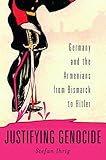Justifying genocide : Germany and the Armenians from Bismarck to Hitler / Stefan Ihrig.
Material type: TextPublisher: Cambridge, Massachusetts : Harvard University Press, 2016Description: 1 online resource (460 pages) : illustrationsContent type:
TextPublisher: Cambridge, Massachusetts : Harvard University Press, 2016Description: 1 online resource (460 pages) : illustrationsContent type: - text
- computer
- online resource
- 9780674915152
- 0674915151
- BMBF-Statusseminar
- Armenian Genocide, 1915-1923 -- Foreign public opinion, German
- Armenian massacres, 1894-1896 -- Foreign public opinion, German
- Armenian massacres, 1909 -- Foreign public opinion, German
- Germany -- Foreign relations -- Turkey
- Turkey -- Foreign relations -- Germany
- Armenians -- Public opinion -- History
- Genocide -- Political aspects -- Germany -- History
- Genocide -- Germany -- Philosophy -- History
- Racism -- Germany -- Philosophy -- History
- Nazis -- Attitudes -- History
- Genocide -- history
- National Socialism -- history
- Arméniens -- Opinion publique -- Histoire
- Racisme -- Allemagne -- Philosophie -- Histoire
- Nazis -- Attitudes -- Histoire
- HISTORY -- Middle East -- General
- HISTORY -- Europe -- Germany
- Diplomatic relations
- Genocide -- Political aspects
- Public opinion, German
- Racism -- Philosophy
- Germany
- Turkey
- Außenpolitik
- Armenier
- Völkermord
- Massaker
- Rezeption
- Osmanisches Reich
- Armenian Genocide (1915-1923)
- Armenian Massacres (1909)
- Armenian Massacres (1894-1896)
- 1894-1923
- 956.6/20154 23
- DS195.5 .I35 2016eb
| Item type | Home library | Collection | Call number | Materials specified | Status | Date due | Barcode | |
|---|---|---|---|---|---|---|---|---|
 Electronic-Books
Electronic-Books
|
OPJGU Sonepat- Campus | E-Books EBSCO | Available |
"The Armenian Genocide and the Nazi Holocaust are often thought to be separated by a large distance in time and space. But Stefan Ihrig shows that they were much more connected than previously thought. Bismarck and then Wilhelm II staked their foreign policy on close relations with a stable Ottoman Empire. To the extent that the Armenians were restless under Ottoman rule, they were a problem for Germany too. From the 1890s onward Germany became accustomed to excusing violence against Armenians, even accepting it as a foreign policy necessity. For many Germans, the Armenians represented an explicitly racial problem and despite the Armenians' Christianity, Germans portrayed them as the 'Jews of the Orient.' As Stefan Ihrig reveals in this first comprehensive study of the subject, many Germans before World War I sympathized with the Ottomans' longstanding repression of the Armenians and would go on to defend vigorously the Turks' wartime program of extermination. After the war, in what Ihrig terms the 'great genocide debate, ' German nationalists first denied and then justified genocide in sweeping terms. The Nazis too came to see genocide as justifiable: in their version of history, the Armenian Genocide had made possible the astonishing rise of the New Turkey. Ihrig is careful to note that this connection does not imply the Armenian Genocide somehow caused the Holocaust, nor does it make Germans any less culpable. But no history of the twentieth century should ignore the deep, direct, and disturbing connections between these two crimes. As Stefan Ihrig shows in this first comprehensive study, many Germans sympathized with the Ottomans' longstanding repression of the Armenians and with the Turks' program of extermination during World War I"--Provided by publisher
Includes bibliographical references and index.
Prologue: Franz Werfel Meets Adolf Hitler -- Introduction: Questions of Genocide? -- Part I. Armenian Blood Money -- 1. Beginnings under Bismarck -- 2. Germany and the Armenian Horrors of the 1890s -- 3. The Triumph of German Anti-Armenianism -- 4. From Revolution to Abyss -- Part II. Under German Noses -- 5. Notions of Total War -- 6. Dispatches from Erzurum -- 7. "Interlude of the Gods" -- 8. What Germany Could Have Known -- Part III. Debating Genocide -- 9. War Crimes, War Guilt, and Whitewashing -- 10. Assassination in Berlin, 1921 -- 11. Trial in Berlin -- 12. The Victory of Justificationalism -- Part IV. The Nazis and the Armenian Genocide -- 13. Racial Discourse and the Armenians -- 14. The Nazis' New Turkey -- 15. No Smoking Gun -- Epilogue: Armenian Writings on the Wall.
Print version record.
In English.
eBooks on EBSCOhost EBSCO eBook Subscription Academic Collection - Worldwide
There are no comments on this title.

